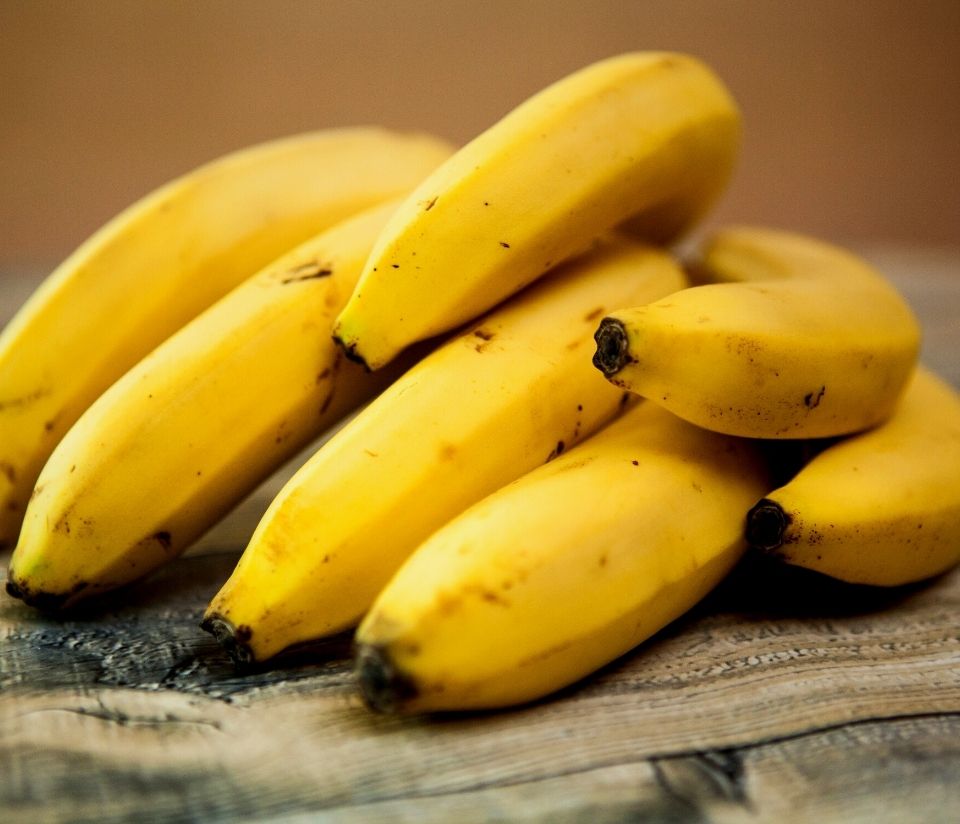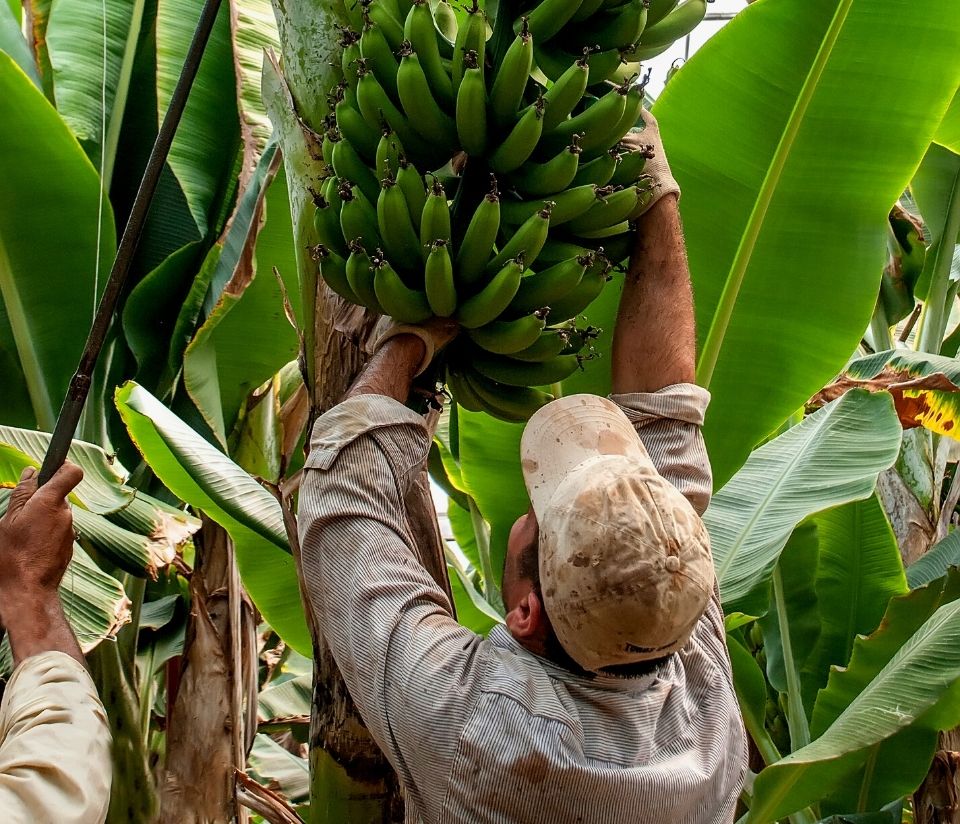
Ethical Bananas: Organic Bananas And Fairtrade Bananas
See our Ethical Bananas Ratings Table to compare brands
A bunch of issues: from avoiding food miles to the benefits of organic bananas
Bananas are one of the most popular fruits in the UK. Making banana bread or a smoothie? Need a quick snack? Bananas are a handy food to have in your kitchen. But how do we ensure that the bananas we purchase come with a minimal impact on the environment? Where can you buy organic bananas? And just how fair is Fairtrade?
The distance that a food item is transported from producer to consumer is typically referred to as ‘food miles’. Food miles are a major problem for bananas in particular. Bananas are often grown in tropical regions far from the UK. According to the Fairtrade Foundation, most bananas sold in the UK come from Latin America and The Caribbean, with around 90% of Fairtrade bananas coming from this region also.
So what’s the issue with food miles? There is a high carbon footprint associated with transporting products over long distances. For instance, the Food Miles Calculator shows that a bunch of bananas from Colombia will have travelled roughly 4,659 miles to reach British supermarket shelves!
But food miles aren’t the only concern for bananas. The fruit is transported in refrigerated ships, which require further energy usage to maintain their low temperature.
Fairtrade bananas and human rights concerns
The production of bananas also comes with human rights concerns. Even if they receive a legal living wage, many banana farmers are not paid enough to cover the cost of living for themselves and their families. This is one of the reasons that Fairtrade bananas are popular in supermarkets. The Fairtrade logo is associated with better pay and working standards for farmers.
Toxic chemicals and pesticides are also a major issue during banana production. Banana Link reports that the banana industry has the second highest consumption of agrochemicals in the world. The use of harmful chemicals- many of which have been labelled hazardous by the World Health Organization – damages the health of farmers and pickers.
Fortunately, our Ethical Bananas Ratings Table gives you all the information you need to choose bananas that minimise your ethical impact. It not only shows you the most ethical banana brands to purchase from, but also which brands are selling organic bananas and Fairtrade bananas.
The Good Shopping Guide research: unethical practices in the banana industry
The Good Shopping Guide’s latest research into the bananas sector reveals the unethical practices that occur and how the industry has changed over the years. Nowadays, the majority of bananas in supermarkets are own-brand products, with very few alternative brands available.
The only banana brand we found to be available in supermarkets’ online grocery stores was Fyffes, which receives the worst score in our research. Fyffes is owned by Sumitomo Corporation, which has been marked down under our Armaments and Nuclear criteria for its involvement in these industries. Fyffes is therefore not a good alternative to supermarket brands and we recommend avoiding them where possible.
Other than Fyffes, all of the banana brands in our list are produced by supermarkets. This is an issue for ethically-minded consumers, as supermarkets typically receive a poor score in our research for Human Rights and Other Criticisms.
For instance, in 2020, Aldi was criticised for pressuring banana exporters in several Latin American countries to lower the price it pays for its bananas. A group of industry associations from countries such as Guatemala and Ecuador opposed the move. Lowering prices risks leaving thousands of banana farmers without jobs. This case reflects how many supermarket chains prioritise their own profits, even if this contributes to poverty and job instability in developing countries.
Why should I buy organic bananas?
Certain agrochemicals can devastate entire ecosystems. Herbicides, fungicides and insecticides can cause indiscriminate harm to many species of animal and plant. Toxic agrochemicals can even damage soil quality, by destroying important microorganisms. Not only do certain agrochemicals directly harm the environment and wildlife, they can also cause health problems in us humans! Organic bananas are grown without the use of pesticides, and so are a more ethical option. Check out our Ethical Supermarkets article to see to buy organic bananas, and which supermarkets offer the most ethical products.

Why should I buy Fairtrade bananas and organic bananas?
Yes, it is difficult to find an ethical brand to purchase your bananas from. Supermarkets are an ethical nightmare. However, ethical online supermarkets such as Abel & Cole and Riverford Organic Farmers receive high scores in our Ethical Ratings Tables. These supermarket bananas may be a good choice for you.
You can still make sure you are choosing the most ethical types of bananas sold in supermarkets, such as Fairtrade bananas and organic bananas. So why are these the most ethical consumer choices?
What does the Fairtrade Foundation do?
Fairtrade bananas helps to ensure that farmers are paid fairly. The Fairtrade Foundation sets standards to ensure that farmers producing Fairtrade bananas are paid a premium. The initiative also demands that Fairtrade employers offer better working conditions and job security.
If you purchase Fairtrade bananas, you reduce global exploitation of banana farmers. Yes, Fairtrade bananas are typically more expensive. But it’s worth the additional cost if the money is going towards a better life for fruit producers.
Concerned about the environmental impact of pesticides in banana production? Then purchase organic bananas. Organic bananas are grown without the use of harsh agrochemicals, they typically come with a lower environmental cost than non-organic bananas. Fortunately, you don’t have to choose between organic bananas and Fairtrade bananas. Lots of bananas are both!
Finally, the issue of food miles is an inevitable cost of purchasing bananas. Since bananas cannot be grown in the UK, there is little we can do to address the food miles issue. Minimise your banana consumption, and ensure that none of your bananas go to waste. If the bananas in your kitchen become too ripe to eat on their own, try making banana bread or banana pancakes instead of throwing them away. Mindful of your potassium intake? Sweet potatoes, spinach and beans also contain high levels of potassium. This makes them great nutritional alternatives to bananas!
See our Ethical Bananas Ratings Table to compare brands
The Good Shopping Guide has researched into bananas brands. Click on each brand name to find out more information about their ethics and sustainability efforts.
Abel & Cole, Riverford Organic Farmers, Co-op Food, Ocado, Sainsbury’s, Waitrose, Aldi, Marks & Spencer, Morrisons, Tesco, Lidl, Asda and Fyffes.